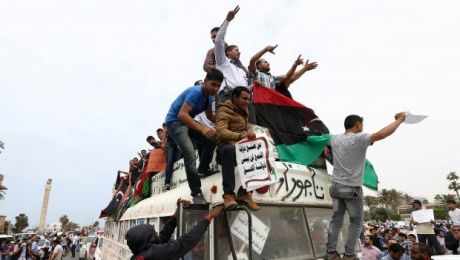News
You are here
Libya: unrest continues

May 22, 2013
On April 28, rebels in Tripoli, the capital of Libya, surrounded the ministries of foreign affairs and justice. They demanded that the General National Congress immediately pass the “political isolation law”—a law barring anyone who held a senior position in the Gaddafi regime from government. An overwhelming majority, an indication of the vulnerability of the current regime, soon passed this law.
Critics of this measure have pointed out that in the 42 years of Gaddafi's rule, various senior officials defected, some even playing a part in the revolution. The rebels do not consider this adequate grounds to give them their trusts, a sentiment clearly shared by a fair number of Tripoli residents: according to Al Jazeera, when the law was passed, “hundreds... filled Tripoli's main square” in celebration.
The rebels, unwilling to take the GNC at their word, did not immediately leave the ministries and instead expanded their demands to include Prime Minister Ali Zeidan's resignation, the freezing of a recently released state budget and the right to form a committee to take charge of the Foreign Ministry. Zeidan is himself a former diplomat under Gaddafi who defected and was exiled in the 1980s.
In response, a rival coalition was formed including some federalists from Cyrenaica and some former rebels from a several towns, including Benghazi, where the Libyan Revolution began. This coalition expressed support of the government and threatened to dislodge the rebels. The Federalists have been demanding greater autonomy for the oil-rich East, which they see as having been squeezed of its resources and underrepresented in government.
The rebels ended their siege on May 12, leaving a bouquet of flowers. It is not clear whether this was a result of the threats from the rival coalition or because a deal was struck with the government. Zeidan has not resigned.
Two years since the death of Gaddafi, these developments show the contradictions of Libya's unfinished revolution--which emerged as part of the Arab Spring against repressive neoliberal regimes in the region. NATO's "humanitarian intervention" provided a military cover for polical counter-revolution to install forces friendly to Western oil companies, and to divide the revolutionaries on their attitude to foreign intervention. As a result the various factions that fought against the old regime split apart fairly quickly, not only along class lines, but along lines of race, region, and sect. The recent developments show both the ongoing desire for revolutionary change, but also the fragmentation that "humanitarian intervention" produced.
“Unrest” has not ended: the siege at the ministries came on the heels of the bombing of the French Embassy (possibly in response to their imperialist war on nearby-by Mali); police stations have been bombed, both Britain and the United States have pulled staff from their posts, and—perhaps more importantly—so has British Petroleum.
The UN voted just last January to keep Libya subject to Chapter VII of the UN Charter. This is what sanctioned the “intervention” (i.e. bombing) by NATO in 2011. We must be oppose any further Western interventions in the region.
If you like this article, register now for Marxism 2013: Revolution In Our Time. Sessions include "Libya, Mali and Canadian imperialism", "Permanent revolution: the Arab Spring two years later" and "Egypt: class and revolution."
Section:
Topics:










